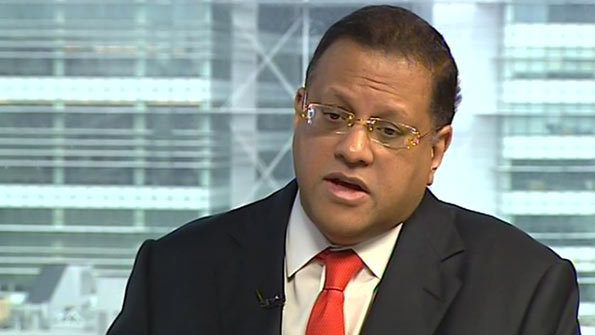CB Chief slams tax system

Tough-talking Central Bank Governor Arjuna Mahendran yesterday slammed Sri Lanka’s tax system as “pathetic” and “regressive,” insisting it needed to be boosted through fresh measures and called for reduced stress on State banks placed by loss making State Owned Enterprises (SOEs).
Delivering the inaugural address as the Chief Guest at the Association of Professional Bankers (APB) 27th Anniversary Convention, Mahendran engaged in a frank discussion of the country’s economy, pointing out “Sri Lanka taxes its people like a sub-Saharan country”.
“We have fallen into a trap of depending on foreign loans to fund our development. A lot of concrete has been poured into projects in Sri Lanka during the last few years on loans borrowed on high interest, which is fine if we can get good returns, but the numbers suggest otherwise. So clearly we have to innovate to get out of this situation and it’s a pretty simple issue. Despite our high per capita income we tax our people like a sub-Saharan country. Currently tax revenue is around 10% and that is pretty pathetic, I don’t mind saying in public.”
“So the Government can’t finance its debt, much less run the rest of Government functions, and that needs to change,” he said.
Elaborating on the convention’s theme of ‘Innovate to Win,’ the Governor continued with his forthright views, noting Sri Lanka’s economy would “make it or break it” simply on the basis of whether it could tax its people on an equitable level.
“The poor are taxed more than the rich. That is the truth. A lot of taxes are indirect and this is where innovation is needed. You have to assist to resolve this issue as privileged members of society.”
Mahendran added that the Central Bank had considered online payment methods for the public to encourage increased payments but acknowledged taxes need to be simplified, tax holidays reduced and the system made more transparent.
“Everyone has to get involved and rationalise this system,” he stressed. “This is where we fall behind.”
He also criticised State Owned Enterprises (SOE), which depend heavily on State banks to fund their functions on beneficial loan terms, which then makes the banks “inefficient and this spills over to the entire economy”.
Touching on the latest Ease of Doing Business rankings published by the World Bank on Wednesday, Mahendran highlighted Sri Lanka’s knotty contract dispute settlement mechanisms, which are time-consuming and complicated.
He insisted the arbitration system is sketchy, “outdated” and not time-bound to assist resolution of contract disputes. The Governor called on the banking sector to chip in on evolving more efficient systems to improve the country’s investment climate.
(Source: DailyFT – By Uditha Jayasinghe)

Latest Headlines in Sri Lanka
- UN pledges support for Sri Lanka’s industrial and SME development March 13, 2025
- Former Boossa Prison Superintendent shot dead in Akmeemana March 13, 2025
- Police search Sagala Ratnayaka’s residence amid hunt for IGP Deshabandu Tennakoon March 13, 2025
- Another Middeniya triple murder suspect arrested at BIA while fleeing March 13, 2025
- Court of Appeal to rule on IGP Tennakoon’s arrest warrant on March 17, 2025 March 12, 2025



This is a good news.
Seems like government will implement a new tax system.
So the forecast is that, burden will transfer to people and country will have a BIG impact when public refuse.
This is a clear strategy to outflow countrymen to abroad for employment.
Who will remain?
Those who like pieces of our country.
Kudos!
Mahendran, ours is an agrarian economy where more than 50+ are employed directly or indirectly contributing more than 50% to the GDP. The agricultural population cannot produce enough to feed itself therefore can be described as subsistence agriculture and the very idea of levying taxes on this population is crazy. The high per capita income reflects the income of about 10 percent of the working population and not the total working population of around 4 million!
The industries are not competitive for they are dependent on imports and what they produce are more expensive than what is imported and to my mind they are designed to drain foreign exchange!
A large number of those employed are involved in services and conributes nothing to the GDP.
During the last couple of years there was a bulding construction boom and infrastructure development funded by the Chinese which which late to growth rates of around 7 percent but the agricultural growth remained less than 2 percent.
So Mahendran taxation without development is not the solution ….the government should look for development aid which contributes to the GDP
I would like to add
Assuming that 50 percent of the `working’ population is employed in agriculture
which contributes about 50% to the GDP in that they produce
Of the balance the only viable industry that does not depend on raw materials is the
tyre corporation however they rely on imports for to support the industry employs less than
1 % of the working population..
Then a large about 25% of the working population is employment in the services transport
education and health and various other ministries contribute little or nothing towards the GDP
their pay is low and is not taxable
Then there are the casual labour about 10 % of the working population street vendors, hawkers street cleaners (abans) making a subsistence pay not liable to be taxed.
That then there are the professionals about 5% of the working population who are taxed but they find ways and means of avoiding paying taxes.
And the balance 10% liable to paxes are involved in large and small and large business and industries. These are the people that according to Mahendran pays about 10 percent of the tax revenue collected.
Tax system is pathetic ???
I thought robbing the central bank in favour of your son in law is even more pathetic.